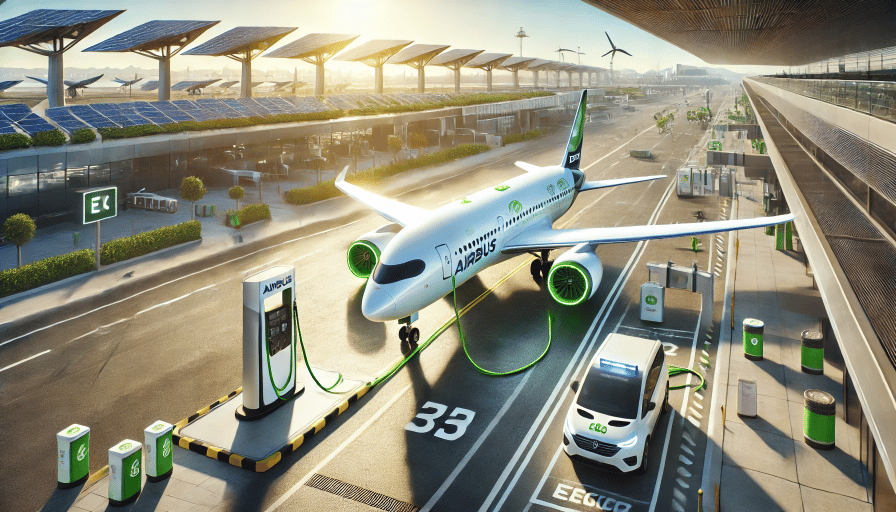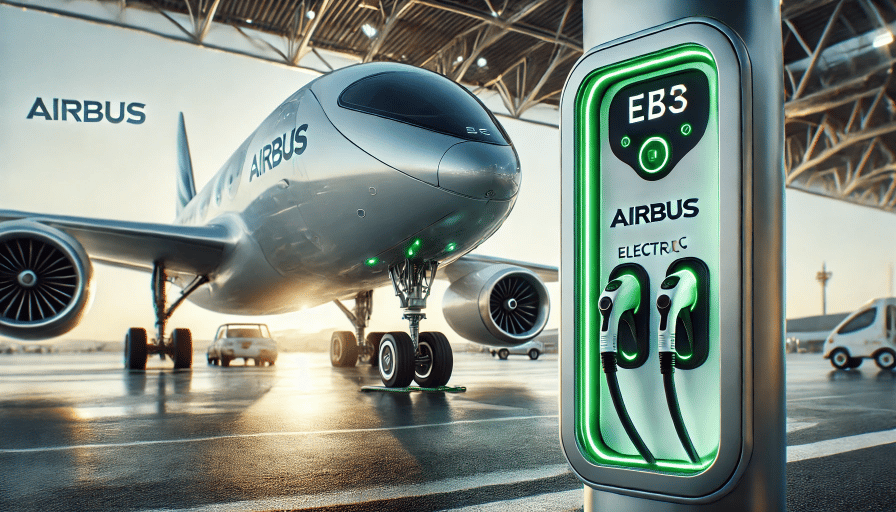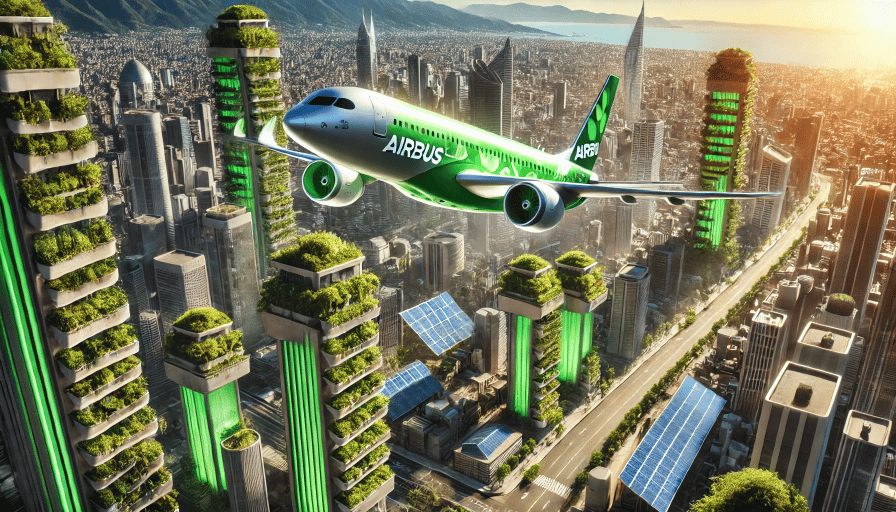- Green Glow
- Posts
- 🌱 How Airbus is Pioneering a Greener Future with Hybrid and Electric Flight ✈️🔋⚡
🌱 How Airbus is Pioneering a Greener Future with Hybrid and Electric Flight ✈️🔋⚡
Discover how Airbus is pioneering a greener future for aviation with hybrid and electric propulsion. Explore their innovative projects, strategic partnerships, and vision for sustainable skies through hydrogen fuel cells, electric urban air mobility, and hybrid technology solutions.
Airbus is at the forefront of efforts to make air travel more sustainable through groundbreaking research and development in hybrid and electric flight technology. Driven by a commitment to decarbonize aviation, Airbus is pioneering alternative propulsion systems that leverage electric power, hydrogen fuel cells, and hybrid configurations to create greener skies. With ambitious projects and strategic partnerships, Airbus is setting a strong foundation for a future where aviation is not only efficient but also environmentally friendly.
Table of Contents

Revolutionizing Propulsion: The Shift to Hybrid and Electric Power
Traditional jet fuel combustion has been a cornerstone of aviation since its inception. However, as the impact of carbon emissions becomes more evident, Airbus is rethinking propulsion systems by shifting toward hybrid and electric options. These technologies aim to drastically reduce emissions and optimize energy use, setting the stage for cleaner air travel. Airbus’ work in this field involves a mix of electric power sources, sustainable aviation fuels (SAFs), and advanced hydrogen technology. Hybrid-electric propulsion, for instance, allows aircraft to alternate between or combine power sources, optimizing fuel efficiency and minimizing emissions.
Key Projects Powering Airbus’ Green Flight Vision
Airbus has launched several innovative projects to test and demonstrate the viability of hybrid and electric flight. Below are some of the most notable ones:
CityAirbus NextGen: Urban Air Mobility Redefined
The CityAirbus NextGen is an all-electric, four-seat multicopter designed for urban air mobility. With vertical take-off and landing (eVTOL) capabilities, this futuristic vehicle is built to provide safe, sustainable transport within cities. Not only is it environmentally friendly, but it also addresses the growing need for efficient transportation in urban areas. The CityAirbus NextGen is an example of how electric flight can revolutionize personal travel in urban environments.
DisruptiveLab: Testing New Aerodynamic and Propulsion Concepts
The DisruptiveLab project is a flying laboratory that allows Airbus to experiment with various hybrid propulsion systems and aerodynamic innovations. Equipped with a fully parallel hybrid system, this testbed enables in-flight recharging of batteries and provides a platform for Airbus to explore a more sustainable rotorcraft design. By incorporating hybrid systems, DisruptiveLab tests ways to reduce fuel use and increase overall energy efficiency, potentially paving the way for future mainstream aircraft.
EcoPulse: A Collaborative Approach to Hybrid Propulsion
In partnership with Daher and Safran, Airbus is developing the EcoPulse demonstrator. EcoPulse is a hybrid-electric aircraft that employs distributed propulsion—an approach where multiple electric propellers are used to optimize aerodynamics and fuel use. Supported by France’s CORAC and DGAC, this project is essential in exploring how hybrid propulsion can be scaled across various aircraft types, creating a flexible model for sustainable flight.

Partnerships Accelerating Airbus’ Electrification Roadmap
Recognizing the importance of collaboration in advancing aviation technology, Airbus has established partnerships with industry leaders to accelerate its electrification efforts:
Renault Group: In November 2022, Airbus and Renault signed an R&D agreement to share expertise in electrification. This partnership focuses on cross-industry solutions to accelerate the development of hybrid and electric technologies, benefiting both automotive and aerospace sectors.
STMicroelectronics: To power the next generation of hybrid and electric aircraft, Airbus is working with semiconductor manufacturer STMicroelectronics. Their collaboration, announced in June 2023, aims to advance research on semiconductors essential for hybrid and fully electric propulsion systems, supporting initiatives like the ZEROe hydrogen-powered demonstrator.
Hydrogen Fuel Cells: The Power of Zero-Emission Flight
Airbus is also leading the charge in hydrogen fuel cell technology, which offers a promising zero-emission alternative. In 2022, Airbus unveiled a hydrogen fuel cell engine that could one day power large commercial aircraft. By converting hydrogen into electricity, these fuel cells could significantly reduce the industry’s reliance on traditional fuels. Airbus’ ZEROe project—a suite of hydrogen-powered demonstrators—represents the company’s commitment to achieving zero emissions in aviation by mid-century.
The Broader Vision: Decarbonizing the Entire Aviation Ecosystem
Beyond developing alternative propulsion systems, Airbus recognizes that achieving sustainability in aviation requires a multifaceted approach. This involves not only creating greener aircraft but also optimizing operations, improving airport infrastructure, and deploying SAF. Airbus envisions a future where hybrid and electric propulsion becomes the norm, complemented by advancements in operational efficiency and sustainable fuel availability.

Conclusion
Airbus’ hybrid and electric flight initiatives are reshaping the aviation industry’s approach to environmental sustainability. Through bold innovation, strategic partnerships, and a steadfast commitment to zero emissions, Airbus is paving the way for a greener future. As these technologies continue to evolve, Airbus’ vision for sustainable skies is coming into focus, heralding a new era of cleaner, more efficient air travel for generations to come.
FAQs
What is Airbus’ goal with hybrid and electric flight technology?
Airbus aims to reduce the aviation industry’s carbon footprint by developing hybrid and electric propulsion systems. These technologies are designed to cut emissions, improve fuel efficiency, and pave the way toward sustainable aviation.
What are the main projects under Airbus’ hybrid and electric flight initiative?
Key projects include the CityAirbus NextGen, an all-electric urban air mobility solution; DisruptiveLab, which tests hybrid propulsion and aerodynamic concepts; and EcoPulse, a hybrid-electric demonstrator developed with Daher and Safran. Additionally, the ZEROe project focuses on hydrogen-powered aircraft.
How is Airbus collaborating with other industries to advance hybrid and electric flight?
Airbus has partnered with companies like Renault and STMicroelectronics to share expertise in electrification and develop essential components, such as advanced semiconductors, which are critical for next-gen hybrid and electric aircraft.
What role does hydrogen play in Airbus’ sustainability strategy?
Hydrogen is central to Airbus' vision for zero-emission aviation. Hydrogen fuel cells, which convert hydrogen into electricity, are being developed to power future aircraft with zero emissions, as seen in Airbus’ ZEROe project.
You May Also Like
🌱 A Green Partnership: How Kazakhstan and the EU Are Collaborating on Sustainability Goals 🤝♻️
🌱 How Chinese EVs Are Dominating the Paris Motor Show: A New Era of Affordable Luxury 🚗🌍
🌱 Why Australia Should Partner with India on the Electric Vehicle Frontier 🚗⚡
🌱 How Recycled Batteries Could Power the Next Generation of EVs 🔋🚗♻️
🌱 China’s BYD: Turning Pakistan into an EV Hub After Indian Setbacks ⚡🚗
External Links
Follow Us:
X: https://www.x.com/greenglownews
Youtube: https://www.youtube.com/@greenglownews
Instagram: https://www.instagram.com/greenglownews
Sponsored Links